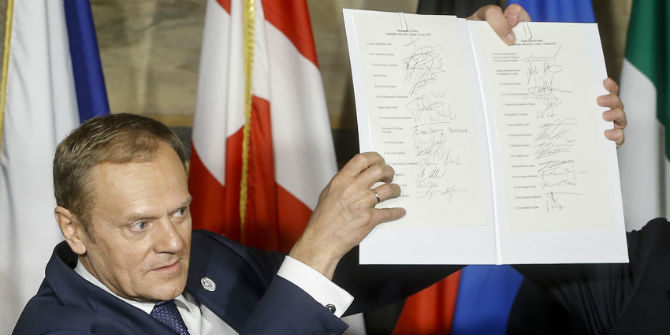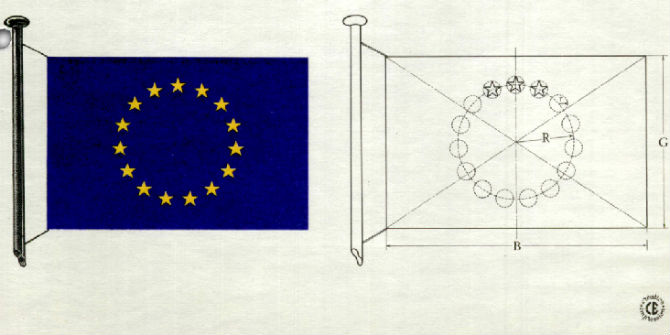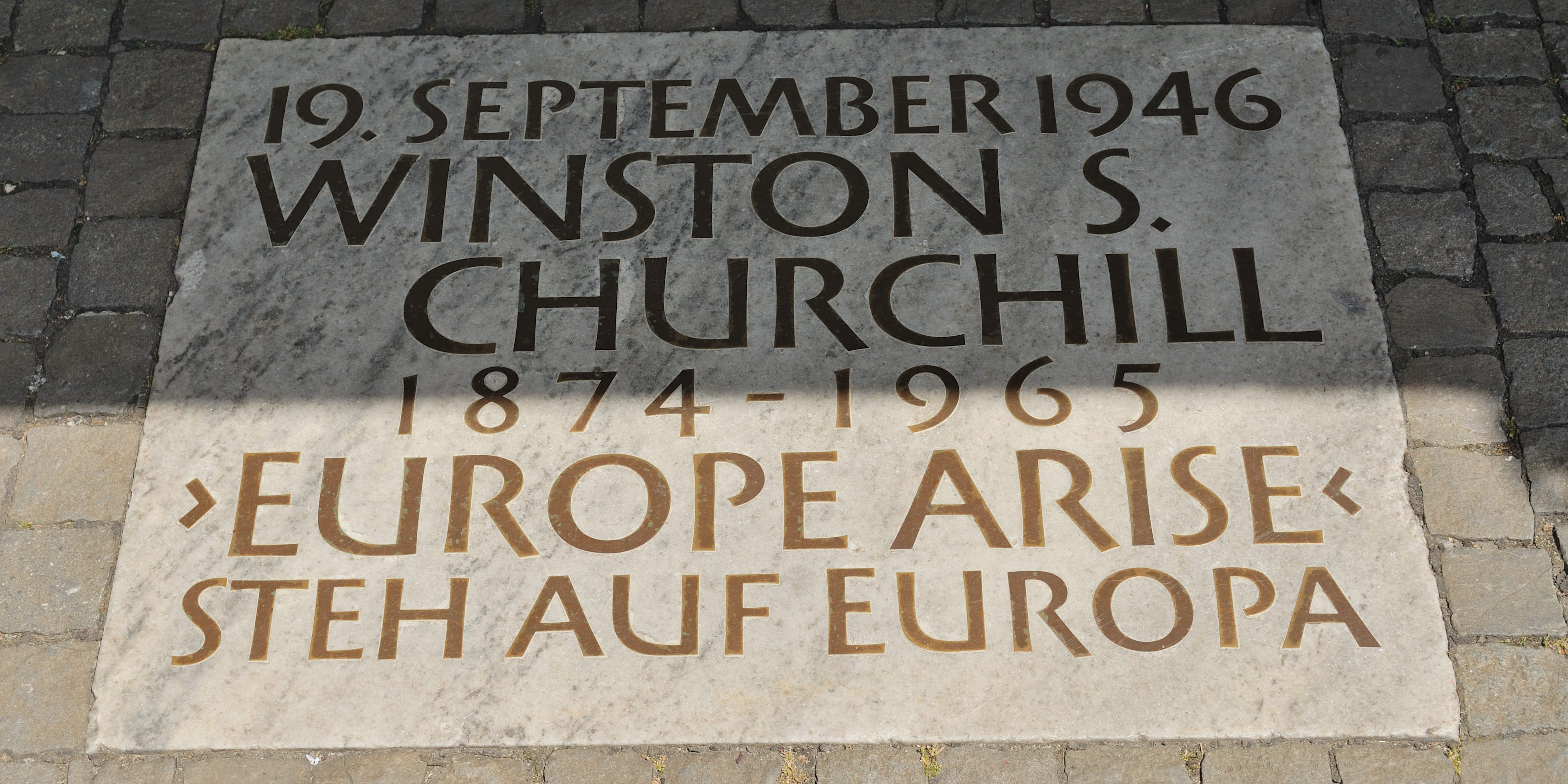While not exactly warm, the tone of Theresa May’s letter to Donald Tusk triggering Brexit was somewhat more conciliatory than it might have been, writes Daniel Schade. In particular, it did not rule out the continuing jurisdiction of the European Court of Justice. But there was a veiled threat in the emphasis on security co-operation – and the UK is still insisting on parallel negotiations, something that the Commission has ruled out.
As the UK government letter triggering Brexit was being delivered by Eurostar to Brussels, there was speculation about whether its language would chime with the somewhat more conciliatory tone of UK government officials in recent days. We need no longer speculate about its contents, which are mainly in line with the UK government’s previously stated aims for the negotiations (such as during Theresa May’s Lancaster House speech) and the subsequent White Paper.
Nonetheless, the letter contains a few striking elements which illustrate the government’s priorities for the negotiation process, and the tone it aims to strike as the EU27 prepare to adopt their negotiating position.

Firstly, while the letter is somewhat shorter than some analysts predicted, its language is solemn and in line with the government’s appeal for Conservative MPs not to appear too happy about the occasion in public. Most strikingly, Theresa May has refrained from using the informal greetings and closing statements that are often handwritten in correspondence between EU heads of state and government. In consequence, the President of the European Council is addressed simply as “Dear President Tusk”, and no personal note is added at the end.
Secondly, the letter makes it abundantly clear that the UK wants this to be seen not as leaving ‘Europe’, but only the EU. Instead it emphasises that the UK is keen to continue to play a leading role “to ensure that Europe remains strong and prosperous and able to lead in the world, projecting its values and defending itself from security threats.”
Thirdly, the letter repeats on four occasions that the UK wishes to negotiate its withdrawal agreement “alongside” the one on its future association with the EU. While the negotiating mandate for the European Commission’s Brexit negotiator Michel Barnier remains to be agreed among the 27, previous statements by EU officials make it highly unlikely that the EU will want to discuss both issues in parallel.
Fourthly, perhaps recognising this, the letter refers to the fact that the UK is willing to negotiate “implementation periods”, which would amount to an interim agreement, “to minimise disruption and give as much certainty as possible.” Similar conciliatory language can be found in the explicit statement that the UK will only cease to be a member of the EU at the end of the negotiation process and will continue to fulfil all of its obligations until then. Relatively soft language is also used in a statement recognising that the UK will have to follow EU rules if it wants to continue to trade with the single market, and even states this would equate to nothing more than what “UK companies do in other overseas markets.”
A fifth important point is that the letter emphasises that as far as the UK is concerned, economic and security issues ought to be seen as two sides of the same coin. After all, the UK’s contribution to European security will be one of its most important assets in the negotiations, given its role in NATO and the fight against international terrorism. So it is logical that the UK government would want to stress what the r27 member states would stand to lose if existing EU frameworks for security cooperation were to be lost over a dispute in the trade element of the negotiations.
This is in line with a different paragraph emphasising the UK’s desire to focus on big issues in the upcoming negotiations and not to be bogged down by the minutiae of legal details. Again, this makes sense from the UK’s perspective as its civil service doesn’t have the necessary negotiation experience when faced with the European Commission’s seasoned trade negotiators. Nonetheless, this desire does not correspond with the reality of today’s complex trade negotiations, where such ‘small’ details often threaten to derail multi-year negotiations.
A sixth element to be considered is what the letter does not actually address. While there has been much talk of ending the supremacy of the European Court of Justice over British legislation, the letter does not mention the court or its future role at all. This is an important omission as it paves the way for the court to play a role for any interim agreement and in the arbitration of future trade disputes – which is likely going to be a key demand of the EU side in the negotiations. Similarly, the letter doesn’t make any direct reference to UK payments to the EU in the divorce talks or into the EU’s budget as part of a future trade agreement, again appearing more conciliatory than some UK government officials or a previous legal assessment by the House of Lords on the issue.
Lastly, the letter repeats previous statements about the importance of the question of the rights of EU27 citizens resident in the UK and those of British nationals living in the remainder of the EU, as well as the importance of upholding the Irish peace process. What is most important to note here is the fact that the letter offers no new insights on how the UK proposes to resolve these complex issues – which is in line with the government’s policy that transparency would weaken its hand in the upcoming negotiations.
Overall, while the letter does not contain anything entirely surprising, the language used to outline the UK’s position in the negotiation process appears somewhat more conciliatory than previous statements by UK government officials on the topic, and certainly much more than Brexit enthusiasts would have desired. Nonetheless, it also contains a few strong demands, such as the insistence on parallel negotiations of the exit terms and those on a future trading relationship, and a thinly veiled threat that Britain wants to see its contributions to European security duly remunerated. Whether the EU27 will take this into account when agreeing on their response to the letter remains to be seen.
This post represents the views of the author and not those of the Brexit blog, nor the LSE.
Daniel Schade is a postdoctoral research fellow in International Relations at the Vienna School of International Studies and the Deputy Chairman of the Project for Democratic Union. He has previously studied for a PhD at the London School of Economics and has contributed to the LSE Commission on the Future of Britain in Europe. He tweets @danieldschade







